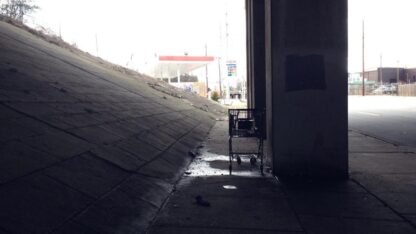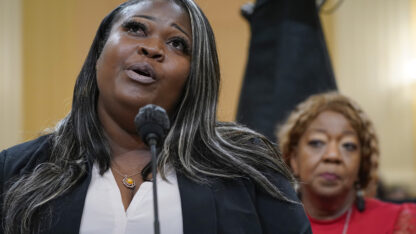It’s not often that you hear someone talk openly about the worst thing they ever did. Rarer still that they’d put up a memorial to it. But that’s exactly what Dad’s Garage Theatre Company has done.
Dad’s Garage is celebrated for its award-winning improv comedy, its ability to attract big-name comedians to Atlanta, collaborations with the Alliance Theatre and the Atlanta Opera, and performances at the Fox Theatre. In short, they’ve been very successful. But downstairs in their lobby, they have a plaque on the wall which reads in part:
“In the fall of 2007, a group of improvisers who shall not be named, perform the worst scene ever. It was not funny, mildly entertaining, or in any way watchable.”
It goes on to call for a moment of silence in memory of that “dark day.” There are only a few left at the theater who witnessed the scene firsthand. One of them is marketing director Jon Carr. Standing in front of the plaque in Dad’s lobby, Carr can laugh about it now.
“It’s the only time I’ve ever been onstage and gotten booed by the audience,” he said, “that’s not an easy thing to walk away from.”
Another “Worst Scene Ever” survivor is ensemble member Tom Rittenhouse.
He said it’s been remembered as “The Genghis Khan Scene.” It took place on May 22 2008, and Rittenhouse knows the exact date because he has the lone surviving video tape. The existence of a video recording is in itself an anomaly since, as Rittenhouse explains, Dad’s never tapes its shows.
At the time, Rittenhouse was a member of what was called Dad’s Garage’s “Non-semble.” Today they’re called The General Company and are sort of the theater’s B-team of rookies. Rittenhouse had been with the theater for about a year at this point.
“For months, we’d just been struggling,” he said. “We just weren’t clicking.”
Carr puts it a little more bluntly: “We were doing terrible improv.”
It was director Tim Stoltenberg’s idea to videotape an upcoming show in order for the Non-semble members to review and find areas where they could improve, like a football coach going over a team’s fielding techniques.
So with camera rolling, the improv team asks the audience to suggest a historical figure to base a scene around. Someone calls out Genghis Khan.
Someone onstage assumes the role of the founder of the Mongol empire and the scene somehow winds up in Paris.
“They go to France to pillage,” Rittenhouse recalls, seemingly hesitant to fill in too many details, “and there’s some prostitutes that are crossing the street. And I very uncharmingly started making French prostitute zingers as a French prostitute.”
Carr was acting as host of that night’s show.
“We felt we weren’t doing great and everyone panicked all at once,” he recalls.
The ensuing scene was bad. Like unfunny bad. It quickly got really explicit and really awkward and just generally went downhill. After some grotesque flirting between Genghis and Rittenhouse’s prostitute, Khan orders him to get to his knees.
The audience did not like it.
“I remember it distinctly,” Carr said, “because there was one guy in the audience who started booing. And this boo grew from everyone, all the audience just booing, and not in a funny, that’s a terrible pun kind of way, but like: We hate you as people. We hate what you’re doing onstage.”
“The scene was just never good,” Rittenhouse said. “Nothing about it was good. There was no good narrative, the characters weren’t good, the Genghis Khan impression was not Mongolian. So nothing about it was redeeming.”
Perhaps out of pity or as a means of damage control, the tech shut the stage lights off.
“They were like ‘if this scene goes any further, somebody’s going to get in trouble,’” Rittenhouse said.
When the lights came back up, Rittenhouse was still onstage — still on his knees — with his face buried in his hands.
Two things make this moment even worse: that was not the last scene of the night, so the show had to keep going. And also, there was the tape. This show took place on a Thursday night, so the improvisers had until Monday to stew in their failure before reconvening with their director to go over the video.
“They were all just horrified at having to look at their own misery replayed again,” Dad’s Garage artistic director Kevin Gillese said.
He and other members of Dad’s are standing backstage between shows on a Friday night. The lobby is full of audience members refreshing their drinks at the bar and the green room is full of improvisers getting into costume or just hanging out before the 10:30 p.m. performance starts.
There are a lot of factors in this story that contribute to the infamy of the “Worst Scene Ever.” There’s the visceral embarrassment of being booed by an audience. And then there’s the fact that there is a recording of it. Apparently no one has seen it since that Monday workshop. Rittenhouse has the only copy and if you’re wondering if he’s planning on putting it on YouTube or something the answer is a firm no.
Unwilling to distribute it further, Rittenhouse provided WABE only with a brief clip of audio of the tape for this story.
“I’ve been in some bad scenes but you could talk about them immediately because it was no big deal,” said associate artistic director Matt Horgan, “but this was so bad that no one could reference it.”
“At least it wasn’t Genghis Khan” eventually became shorthand around the theater. The story got passed around cryptically, and it grew until there were conflicting accounts. For instance, the plaque on the wall reads that it happened in 2007, Rittenhouse said 2008. Other characters such as Hitler found their way into the telling of the story, but this is how urban legends get started.
But apart from that, according to Gillese, these moments can bring people together.
“Everybody’s got their Genghis Khan to a certain extent,” he said backstage, “everyone’s got their epic failure. It’s almost like a rite of passage for an improviser, you need to just bite it at least once, hard, or you’re not really gonna get anywhere.” Other folks in the green room chime in, in agreement.
“Even last night we had some Genghis Khans!” someone laughs.
For Rittenhouse, that scene had a profound effect on his work as a performer.
“I took a long, hard look at myself,” he said chuckling.
He explains that back then, having only done improv for a year, his instinct was always to go big onstage, sometimes stealing the scene much to the chagrin of his scene partners. So after the Genghis Khan incident, he committed himself to being smaller. For three months, he told himself he was only going to play background characters.
“I’ll play a tree if I have to,” he said, characterizing his pledge.
And he said at first, not knowing how to support very well, he kind of failed at it. But he kept getting onstage.
“After those three months,” he said, “I found a range.” The relief in his voice is still apparent these years later.
Failing as thoroughly and dramatically as he did put Rittenhouse on the road to being a better actor overall. At the same time, the theater pointing to that failure and hyperbolically calling it the “Worst Ever,” in a way, liberates everyone there to take bigger risks.
“[It was] like ‘oh, that’s failing? OK! That’s not so bad,’” Rittenhouse said. “And that’s sort of the draw of improv. If there isn’t the risk of failure, then what’s the point?”
You can read Rittenhouse’s blog post on The Worst Improv Scene Ever at Dad’s Garage’s blog.

9(MDAxODM0MDY4MDEyMTY4NDA3MzI3YjkzMw004))






